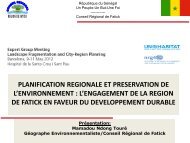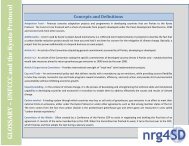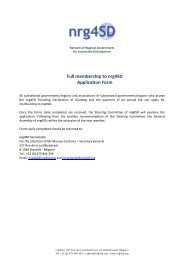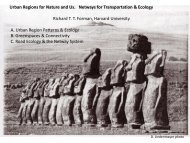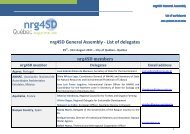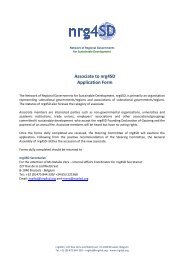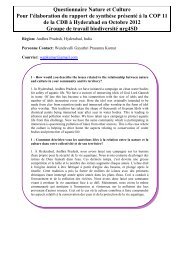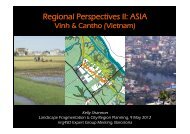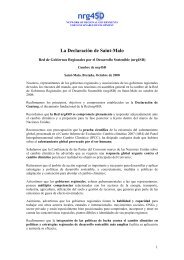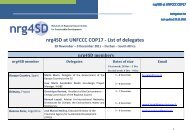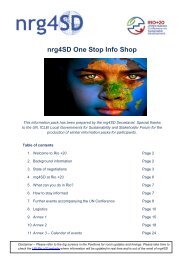Post 2015 Development Agenda: Guidelines for Country ... - nrg4SD
Post 2015 Development Agenda: Guidelines for Country ... - nrg4SD
Post 2015 Development Agenda: Guidelines for Country ... - nrg4SD
- No tags were found...
Create successful ePaper yourself
Turn your PDF publications into a flip-book with our unique Google optimized e-Paper software.
Invite actors who would not otherwise have a seat at the table, to encourageinclusiveness, such as adolescents, migrant workers, homeless, sex workers etc.However, keep in mind skill gaps, particularly <strong>for</strong> organizations that do not regularlyengage in higher level processes or have limited capacities. In some cases, stakeholdersmay need separate time, perhaps with a process facilitator, to develop their inputswithin their own structures be<strong>for</strong>e sharing them with the broader consultationprocess. Also keep in mind personal security risks, particularly <strong>for</strong> those most marginalized.When appropriate, identify and work with established civil society networksand plat-<strong>for</strong>ms, which are country-based umbrella organizations whose raison d’être isto represent the collective interests of their members. A well-functioning plat<strong>for</strong>m canprovide a powerful and legitimate avenue <strong>for</strong> a strong, cohesive and credible voice <strong>for</strong>civil society. However, the actual consultations should not be limited to such groups.When appropriate, identify and work with institutions <strong>for</strong> tripartite socialdialogue (e.g., economic and social councils). Governments, employers’ organizationsand trade unions will be represented in these structures. Some of these also includeactors from civil society.Ensure that membership-based organizations representing massive numbers ofcitizens are given an extra representative voice as compared to smaller groups or NGOs.For instance, such organizations may be allowed two more delegates than smaller organizations.toolsAnnex 2.1: List of stakeholder groups2. How to engage? Preparing an inclusive consultationIt is important to bear in mind possible differences among various stakeholders’ decision-makingprocesses, which may be different from mainstream decision-making based on repre-sentation,delegation of power and/or majority rule.The following points may be useful <strong>for</strong> developing a consultation plan.a. Questions to ensure inclusiveness and accountability when planningInclusivenessAre there any constraints that may block the participation of certain groups ofstakeholders (e.g., sociocultural and economic; gender; capacities and abilities; timeand mobility; legal and regulatory)? Are there differences between various stakeholders’decision-making processes, <strong>for</strong> instance with regard to representation, delegation ofpower and/or majority rule?How can we ensure that communication tools or channels are tailored to stakeholdergroups’ values, norms and languages?What culturally appropriate consultation mechanisms can be established throughthe creation of consultative groups, or through consultations at the local level?22<strong>Post</strong>-<strong>2015</strong> <strong>Development</strong> <strong>Agenda</strong> Process: Guideline <strong>for</strong> Consultations



